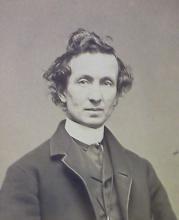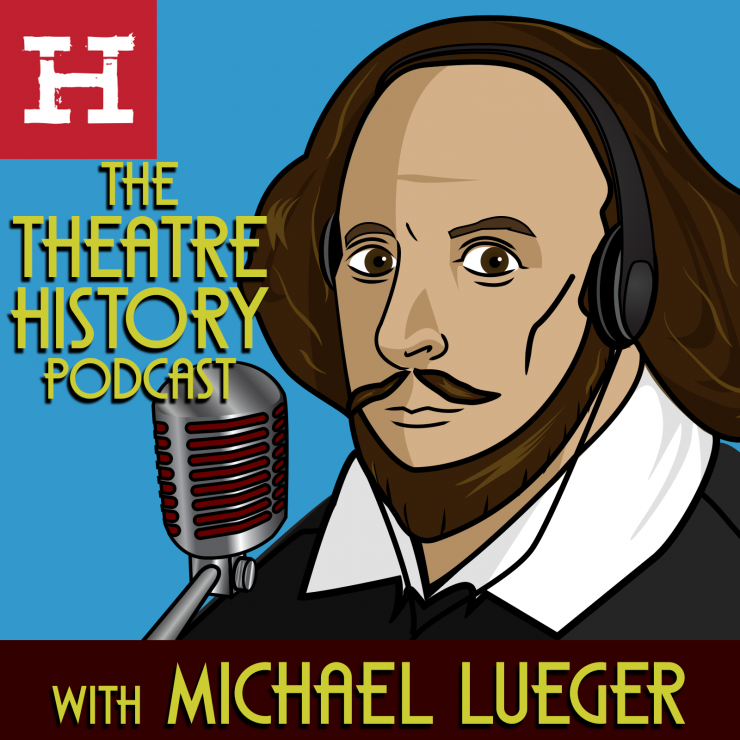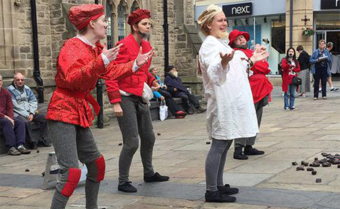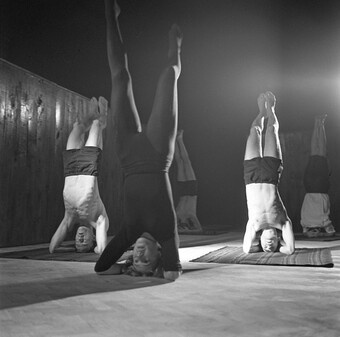Theatre History Podcast # 37
Examining the Diary of Nineteenth Century Actor Harry Watkins with Dr. Amy Hughes, Dr. Naomi Stubbs, and Dr. Scott D. Dexter

What was it like to be a working actor in the United States in the nineteenth century? The diary of Harry Watkins—who made a living acting, playwriting, and stage managing in the antebellum era—provides us with some insight into the way in which life in the theatre has and hasn’t changed over the last century and a half. Dr. Amy Hughes, Dr. Naomi Stubbs, and Dr. Scott D. Dexter are our guests this week, and they’ve been working on producing both scholarly and digitized versions of Watkins’s diary.
Links:
- Want to read Harry Watkins’s diary? Harvard University’s Houghton Library has a digital facsimile available here.
- Learn more about how Amy, Naomi, and Scott are bringing Harry Watkins’s diary into the 21st century at their project’s website and keep up to date on the project on their Facebook page.
- What was Harry Watkins doing on this day 171 years ago? Follow him on Twitter for brief daily excerpts from his diary.
- For more about TEI: Text-Encoding Initiative, a consortium that collectively develops and maintains standards for the representation of texts in digital form, visit http://tei-c.org.
Transcript:
Michael Lueger: The Theatre History podcast is supported by HowlRound, a knowledge commons by and for the theatre community. It's available on iTunes and HowlRound.com.
Hi and welcome to the Theatre History podcast. I'm Mike Lueger. Many of this podcast's listeners probably know what a life for an actor, stage manager or, playwright is like in the twenty first century, but what about the 1800s?
One of our best sources for answering this question is the diary of Harry Watkins who filled all three of those roles at various times during his lengthy career. Now that diary is being edited and digitized by a new project, which will result in a publication entitled A Player and a Gentleman, The Diary of Harry Watkins: Nineteenth Century US American Actor. Today we're joined by that project's co-editors, Dr. Amy Hughes and Dr. Naomi Stubbs, and by the project's director of technology, Dr. Scott D. Dexter. Amy's an associate professor of theatre history and criticism at Brooklyn College. Naomi's an associate professor of English at LaGuardia Community College. Scott's a professor of computer and information science at Brooklyn College. Amy, Naomi, and Scott, thank you so much for joining us.
Naomi Stubbs: Thank you for inviting us.
Amy Hughes: Thank you, yes.
Michael: Let's start off by talking about Harry Watkins himself. Who was he, when did he live, and what was his career like?
Naomi: Sure. I'll take this one. So between the ages of thirteen and twenty, Harry was actually in the army. He enlisted twice. Even at that point, he was involved in performances. He was a fife player, he played a variety of roles in productions that they had, both male and female roles.
At the age of twenty that's when he decided, now is the time to start a career as an actor, and that's actually when we join him with the diary. He's on a boat on his way from New York to Galveston, Texas in 1845, embarking on this new adventure as an actor. He's a little anxious but also a little excited. He doesn't quite know if it's gonna work, how he's gonna make it, how much money he's gonna make, where he's gonna get his next meal from. And so initially he takes on very small parts where he can, struggles to purchase clothing, food, which he records in the diary. He tells us what he's able to purchase. He has his first benefit performance. It's canceled because not enough people show up. But it's rescheduled and he gets six whole dollars the second one, so he's pleased with that. On he goes.
While he's taking these various parts in various places, he observes a lot of stars come and go. He often a little perplexed, confused, as to why these people are stars and other people, who perhaps are more talented, in his opinion, don't necessarily make it. That's one thread he keeps coming back to throughout the diary.
So into the 1850s, he's turns his hand to managing theatre companies. First, one that tours in the south, and another in Williamsburg, then he starts writing his own plays. He works with P.T. Barnum as director of amusements. He writes a number of plays there based on stories that are published in the newspaper and novels, adaptations of other plays, a variety of material. He actually wrote over fifty plays that we can identify, but only one of them is in print. So only one of them we still have. We do know he kept them, his daughter refers to them at some point but quote unquote "mysteriously disappear".
Let's see. He gets married to an actress, Harriet Melissa Secor, and has two children, then gets divorced in '59, when the diary is silent. Right. The diary is written during that year, but we don't have it. We know it was written that year, there are clues in the diary that tell us it existed but it has disappeared.
Amy: The volume.
Naomi: The volume has disappeared, yes. And in 1860, we come back to the diary. He has at this point remarried. He's now married to Rose Watkins. Before that she was Howard, before that she was Shaw. They're in England on a starring tour, well starring in air quotes of course.
Amy: (laughs)
Naomi: His wife is received much better than he is. The diary ends mid-entry in 1860. We don't know if there are any pages after that point but they do stay in UK until 1863. Then they return to New York. He has two sons by his second wife, although they die as adults. They die close together but he carries on acting with his wife and his daughter, Amy Lee. They periodically tour, but mostly are based in New York. He dies age fifty-nine. He never became famous, but he did earn some respect by the end of his career. He was well known. I think that's what makes him so fascinating right, is he is this character, certainly. But he's the... I don't even know if we can use the word "typical", but he wasn't celebrity, he wasn't a person writing with the benefit of hindsight, he's writing as it happens, in a sort of mediocre career.
Michael: And Naomi, just a moment ago you mentioned something called a benefit performance. Could you explain what that is, how that fit into a nineteenth century actor's career?
Naomi: Certainly. This would be something that would often be written into the contract as part of the deal that they would get for the acting services. It would be, third night or beyond, it would be the profits of the performance, so profits and sometimes after a certain amount, would then go to that actor. So the money... they would do the advertising, they would put together the schedule and what they would perform that night and then whatever profits would make would be theirs. If it was a clear benefit. It might be a shared benefit in which case they'd get less, shared with someone else.
Michael: What kind of picture does the diary give us of daily life in the nineteenth century theatre? We probably know of stars like Edwin Booth or Charlotte Cushman, but what's it like for someone who's just kind of doing this as a job? What's the daily grind for someone like Watkins.
Amy: That's a great question, this is Amy by the way. One of the reasons why Naomi and I decided that this was an important project for us to pursue, to make the diary more accessible to a larger audience is because there is no diary like it.
Other diaries that exist either are shorter, they span less time in contrast to Watkins' diary, which spans about fifteen years before the Civil War. Other diaries are later, after the Civil War. Other diaries are more like notes for each day, as opposed to the narrative stories that Watkins offers in his diary. It's all of those things together: the length of the diary, the scope of the topics discussed in the diary, and the density of the writing itself that allow us a really interesting view into what it was like to be a working actor, who never got famous, as Naomi points out and how difficult it was.
I think that as students who have worked with us on the project and colleagues who have read the diary, or any of the people we've talked about it with, they all say that it's very familiar to what it's like to struggle as an actor today. He is struggling at the beginning and throughout his career that tracked at least in the first fifteen years of this diary with doing everything from acquiring props and costumes that he needed in order to get hired and perform the roles expected of him in the theatre company, to affording a pair of boots to walk around town in, like muddy Galveston, Texas, where the diary begins. He really needs a pair of boots because the streets are not paved. It's basically glorified muddy sand and he doesn't have the appropriate footwear. I think that all of us who've tried to pursue careers in theatre have had similar challenges at certain points, maybe throughout our lives. So it's strikingly familiar.
And there are other things for more academic readers that might be, that we believe are of interest, in terms of the daily’s of his reports about the weather, which for an actor were incredibly important. The weather was a factor in how many people came, not only to a regular performance, but especially to a benefit. Watkins diary, through these many, many entries ... By the way it's like a thirteen volume, 1200 pages long, so substantial, you see through this cumulus data about weather, about salaries that he earns, about things that he does to collect material, the materials that he needs to be a successful actor. These very fine grain details over time allow us to see very interesting patterns about what it was like on a daily basis.
Michael: Now I have to ask if each of you have any particular favorite entries from the diary.
Naomi: Oh that's a tough one! So many, many favorite entries. It's always hard to pick between sort of the "significant ones" like when he covers he has to play Tsrious or he's negotiating with P.T. Barnum or the sort of really trivial ones with the elephant's hats and umbrellas and such like.
But the one, for another day, the one I think I'll share today would be the one where he goes to listen to Lucy Stone give a lecture on women's rights. He is persuaded by her, he begins with: "she is a very convincing speaker, I agree with her. Women should have equal rights. In fact there are a lot of careers that are closed to women that should be open. Women for example would make excellent physicians. They are caring by nature."
"Actually, wait, if she's too pretty and she tries to take a man's pulse then she's not gonna get an accurate pulse, 'cause his hearts gonna be all fluttery. So maybe not a physician. And maybe she shouldn't be involved in the law. And maybe not in courts. Maybe not in the bars. Maybe not—you know what, women already have plenty of rights. If they find themselves the right husband, he will give her her rights. That's all they need to do. And you know what—she's just got a pretty face and a passable figure, I'd be game for marrying her."
And his last line is "What say you, Lucy?"
Amy: (laughs)
Naomi: (laughs) It's this delightful combination of the voice he has, you love him or you hate him, but you can relate to him, while he's talking about something that we know about. Right, we know academically about what was happening, but to have this way in through his voice. It's just so much fun.
Amy: Yeah, and I have been really enjoying our excerpts of Harry Watkins diary. I know Mike you know about this, we have Harry Watkins on Twitter thanks to Scott, who's created an excellent program. You and all of us can, at 8 a.m. Eastern time, every morning get a little tiny excerpt tweet-length, from the diary. It's timed so that this excerpt is 171 years ago today, Harry Watkins, wrote blank. Recently, I think it was June 6... Sorry, June 8, on the feed Harry Watkins, this means that Harry Watkins wrote this in June of 1846, the excerpt on Twitter is:
"I bought myself a summer coat. Four dollars, fifty cents. I am too poor yet to buy a pair of pants."
And I love this because it's another reminder, like I was saying before, how much of a struggle especially in these early months. This is literally about eight months into his career professionally. He was just trying to get the basics. But even better was, and why I wanted to share this tweet with you is because, someone who we don't know but follows Harry on Twitter, Peter Schmidt who's in Philadelphia, he's an acting teacher. He wrote back to Harry Watkins, he said, "hope it was a very long coat then!" And I just laughed. That's what we’re looking forward when the diary digitally comes to fruition, and as we continue we hope the Twitter and engage a wide range of audiences in different medium with this very interesting text, that gives us a nice interesting engaging glimpse of nineteenth century life, whether you were an actor, a manager, a playwright, or not.
Another, if I may, I'd also like to share one other thing, it's not a specific entry but something I've learned from the diary and looking at it cumulatively, on that note of profession. It seems to me or what I've learned more deeply than I ever did before working with Harry's diary, is that...We have these very specific delineations between actor, manager, designer, playwright, etc. in twenty-first century theatre and most of the twentieth century in the US. His career, Harry Watkin's career really emphasizes actually, how when you look more closely at what people did, those lines were very blurry.
The entries in which he writes about composing plays, in which he discusses his struggles as a theatre manager on tour, in which he discusses what it's like to manage a company of actors, it became clear to us how this is a different time. Even though his struggles are familiar, even though we can relate to him, we see something new through him, I think, more deeply, which is how much of a tight knit community theatre makers were and how they really did...They were jacks of all trades. They knew how to market themselves for benefits, because they had to advertise in order to attract those spectators to their show. They often would write their own plays. This is something that Harry did, as Naomi said, in order to create a sort of package deal for a producer to hire me I'm bringing all these new plays that I've written that no one's seen, your audience will want me there and will love these plays.
That's something that various entries really highlight, I think. As Twitter unfolds and as the book project and the digital edition unfold, I think other people will be able to see that too.
Michael: One thing I've noticed from following the Twitter account and listeners, it is really engaging and really interesting to do, so please follow that. But I've noticed that there's a fair number of comments that he makes about the drunken state of some of his fellow actors. Scott, if you run the twitter account, maybe that's an editorial decision or that just happens to be a frequent comment that he makes.
Scott D. Dexter: Actually, the content of the Twitter account was produced by one of our students.
Amy: Actually went through the diary and highlighted—
Scott: Ah, a collaborative effort from... I just wrote the code that's spits the stuff out but ... (laughs)
Amy: (laughs)
Michael: Now can I ask what your project's plans for the diary are, and in particular how the digital aspect adds to it? Above and beyond kind of the traditional edited volume.
Naomi: The print edition is because of the limitations of print publication is obviously going to have to be selections from the diary. It's only going to be about 40 percent of the complete text. In making those selections we've also had to juggle a lot of different priorities. Who is our reader? What do we deem significant to be included in the diary? I mean really focused on maintaining the narrative so we can follow through certain threads of what he was telling, and eliminating some of the dailies of what he does just record the weather, and what he did in the morning and afternoon, and the time he was in theatre, typically reading, writing, walking and theatre was seven o'clock. Eliminating those. In doing that we're hoping to make sure that its available then to scholars certainly, and to students, and to be used in a classroom but also to be very readable text, so this is sort of bed side reading as well. It's gonna be annotated so it will include things like noting things that have been deleted or added into the diary, 'cause it goes back and makes changes after the fact. But it is taking a lot out and that is why we really want and kind of insisted on having this digital edition to allow the full text to be out there. For the digital edition, I'll pass it to Scott.
Scott: The digital, how that will work, are to be controlling by collaboration with a publisher. We've been doing for the last several years is a digitally included piece of text with the intention that it can be relatively easily manipulated, once in a form the publisher needs to make it presentable on a website. The specifics of what they would want, what their frame work was going to be are yet to be determined. I think we are very well positioned to relatively quickly turn this into something that can published online in a use-able way.
Amy: To get very technical, the way that we've done that is by making this a born digital transcription. What that means is, when we transcribe the diary originally with the assistance of students on our respective campuses, we did that in XML code. XML, unlike HTML, is a relatively stable code that allows us, despite changes in technology and the fashions thereof, to plug it into an interface with relative ease. We also included in XML following a schema that is... It's so hard to talk about this it's technical but a schema using best practices recommended by something called The Text Encoding Initiative or TEI, a lot of scholars have gotten together to create rules and best practices for encoding digital texts, or encoding texts digitally. Tagging them with these codes that will have more longevity, more sustainability than other kinds of codes. We're hoping that this will allow the transcriptions to survive long after other kinds of technologies have gone out of style.
Naomi: One other thing with the coding that we've done, because we've coded what he actually wrote and then corrected. For example if you misspelled a name or a word, we've coded it so you can look at what he actually wrote or what the word should be. If you're trying to search an entire text and you spell the word wrong you're not gonna find it. This coding will allow researchers to be able to find the terms that they're looking for. Same with abbreviations. If he's abbreviated something you can choose to look at the abbreviations or you can choose to look at the extended version. If you're searching, you'll find it even he abbreviated it.
Amy: We'd be reminisced to not note that University of Michigan Press has been very supportive of this project from when it was just an idea, especially Leanne Fields, our editor, the project's under advanced contract with them right now and we expect they'll publish the print volume in the next year or two and then simultaneously, we'll be working on the digital edition. The idea is for that to be posted on the Michigan Publishing website so that anyone can access it.
Michael: None of us are able to watch Harry Watkins perform. He lived in a time before video recording or anything like that. One of the questions that this podcast keeps coming back to is, how do we get the experience of someone like Harry, how do we recover that, and try to begin to understand it? I'm curious among the three of you if you've come to any revelations or discoveries about how using technology can help us do that? With theatre history and this specific case or just with history in general.
Amy: Great question.
Scott: This is a very good question, which I probably can't answer. (laughs)
Amy: (laughs)
Scott: I can talk a little bit about what technology has meant to us and then we'll get close to an answer to that question. I was reading not too long ago an article by a social historian Steve Briar who pointed out that historians have been using computation to do history since at least the 1970s, which is pretty respectable in terms of the history of computing at least. Using computers to do history is not the newest thing ever, but what it certainly does for us in this sort of twenty first century ecology is I think it makes it...It provides new opportunities to generate, to disseminate, and to analyze this kind of historical data.
That's why Twitter is great example of the kind of dissemination that was previously not imagined. But the other thing that really made a difference with this project I think is the kinds of collaboration that technology really does. We've been able to coordinate the efforts of about two dozen people over four or five years across several campuses within the city and universities of New York without necessarily needing to meet face to face or be working at the same time.
Technology allowed us to do that which is a kind of production that, again we couldn't have done twenty years ago. I would argue without that possibility there'd be no way for us to produce this 1200 page text and make it available in the career of a single scholar. Simply the amount of work to be able to coordinate and extract from our students has been really remarkable. It's worth noting that technology in this case is not a labor saving device at all. It's a labor demanding device or at least a labor investing mechanism, so it's been a ton of work to create this digital transcription. The technology is not saving us from that but it has made certain parts of it easier and I think it's gonna make much of it much more accessible when this project comes to fruition.
Amy: In terms of this broader question you posed, how technology and maybe even this project through its technology allows us to understand more thoroughly the past, which I know is a great concern of yours in the podcast. I think that it's worth repeating that this diary is special. There may be others out there and there probably are, indeed, but we do not know about them. When we came across this amazing text by reading it we were able to get a sense of being there because of his story telling style and his sort of narrative voice and his personality, his jokes, he's humorous. One of the most rewarding things about this project has been working with our undergraduate students and our graduate students who have laughed out loud as well as they've read the diary and created projects, poetry, and songs, all kinds of things inspired by Harry Watkins and his works, his interests, his frustrations.
You really do get... It's one perspective and we should be sure to emphasize that. This is but one, white, male working class, middling actor's perspective, and therefore it's very limited in many respects, but it is something we have. It's something that we have that's very thorough, very dense, very rich, and does I think give us a really nice insight into what it was like to live and work during the pre-Civil War period in the US. Our readers will tell us more about that as we go along, but on Twitter at least, a little bit like that Tweet I shared, the reactions online as well as stuff I said before from our students indicate that it does give you that glimpse of what things were like back then.
Michael: We'll post a link to the project's website and if you want to know what Harry Watkins was doing on a particular day 171 years ago, we'll also post a list to the project's Twitter account, which is available at what Amy?
Amy: @WatkinsDiary
Michael: Amy, Naomi, and Scott thank you so much for joining us.
Naomi: Thank you.
Scott: Thank you very much.
Amy: Thank you so much Mike it was a privilege to talk with you.
Michael: If you'd like to continue today's conversation, please visit HowlRound.com and follow Howl Round and @TheatreHistory on Twitter and Facebook. You can also visit our website at thearehistorypodcast.net where you can find links to all of our episodes. Big thank you to the staff at Howl Round who make this show possible. Our theme music is The Black Crook Gallop which comes to us courtesy of the New York Public Library's LIBRETTO! Project and Adam Roberts. Thanks as well to Tim Cress who designed our logo. Finally, thank you for listening.












Comments
The article is just the start of the conversation—we want to know what you think about this subject, too! HowlRound is a space for knowledge-sharing, and we welcome spirited, thoughtful, and on-topic dialogue. Find our full comments policy here